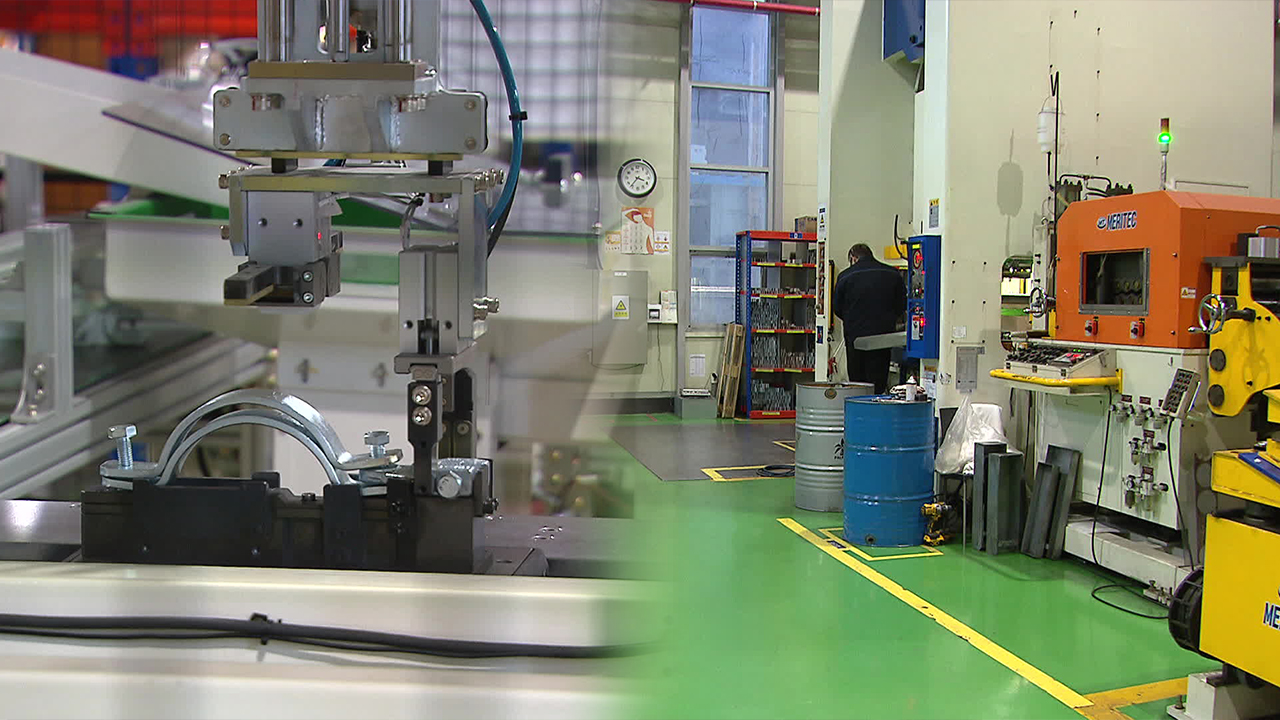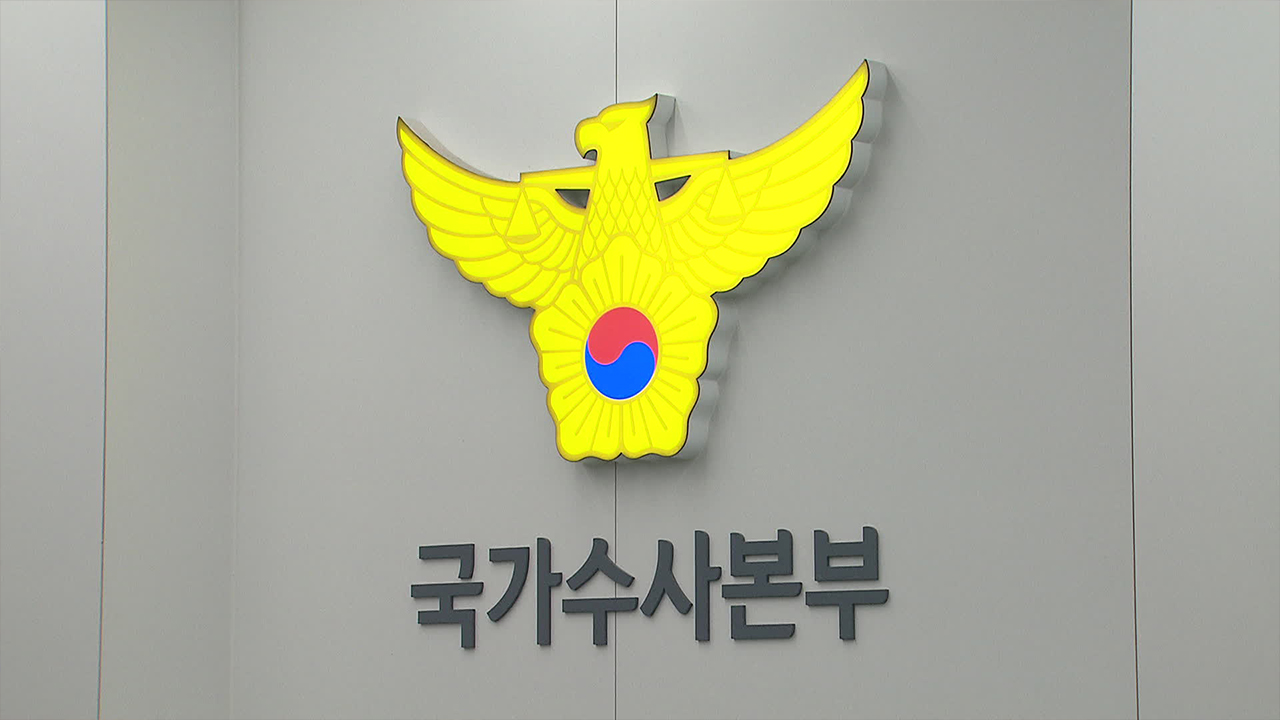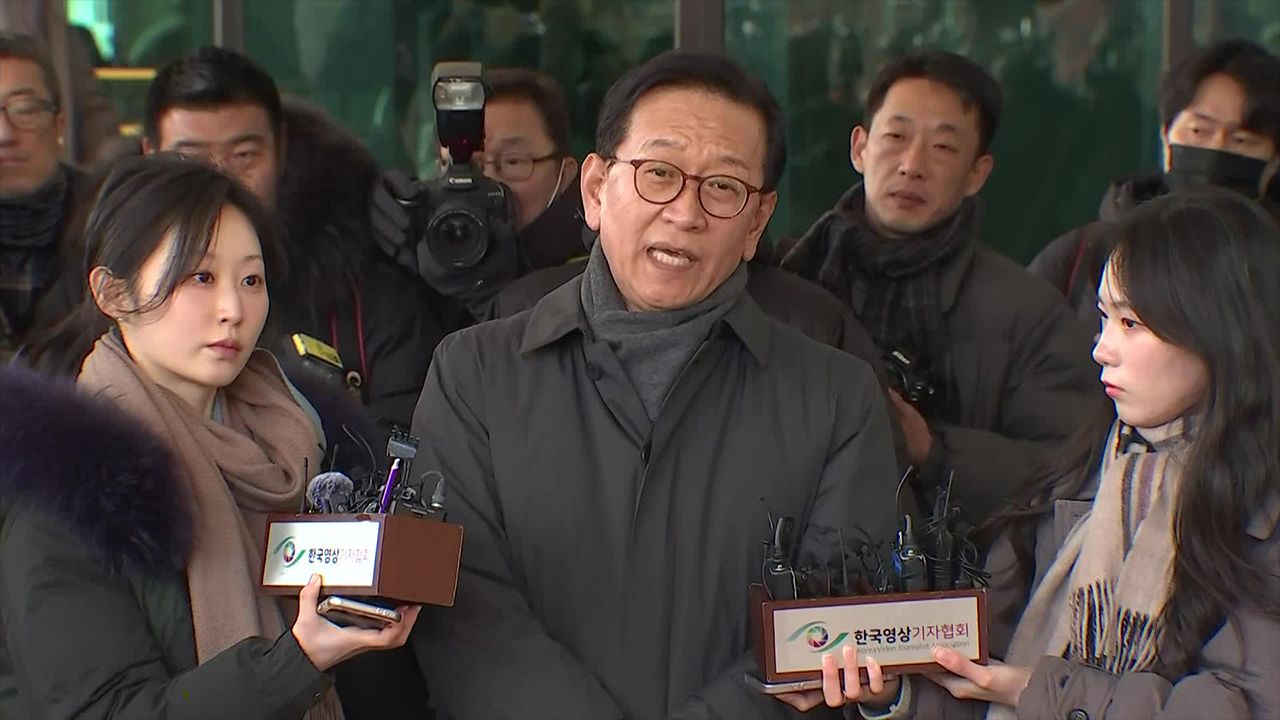Rising exchange rate puts small and medium-sized enterprises in emergency mode
입력 2024.12.19 (23:55)
읽어주기 기능은 크롬기반의
브라우저에서만 사용하실 수 있습니다.
[Anchor]
The rise in exchange rates is particularly hitting small and medium-sized enterprises harder.
This is because they lack liquidity compared to large corporations and do not have enough capacity to respond to sudden fluctuations.
Reporter Kim Jin-hee has covered the situation of small and medium-sized enterprises.
[Report]
This is a manufacturer of equipment that reduces noise and vibration in buildings.
In April, as the exchange rate approached 1,400 won, profitability worsened.
[Yoon Eun-jung/CEO of soundproofing and vibration control equipment company/Last April: "(Profit) should be around 5%, but it has dropped to about 3%."]
After 8 months, the exchange rate has surpassed 1,450 won again, facing another crisis.
["We import castings from China or Vietnam, and the sudden rise in the exchange rate has made it quite difficult...."]
Plans for business expansion have also been put on hold.
["We should have contracted in Dong to establish a new factory in Vietnam, but we did in dollars, which is causing us significant pain."]
This company, which exports children's cleaning products, is most concerned about logistics costs.
[Jo Yoon-soo/CEO of children's cleaning products company: "We need to send our products to the Amazon warehouse in the U.S., but since logistics costs are calculated in dollars, the costs are rising, along with storage fees."]
The rapid rise in exchange rates in a short period is causing difficulties not only for raw material importers but also for exporting small and medium-sized enterprises.
[Han Chang-yong/Head of Policy Consulting Center, Korea SMEs & Startups Institute: "While large corporations utilize various means to mitigate risks, small and medium-sized enterprises often do not prepare for such situations in advance, making it more difficult for them."]
Small and medium-sized enterprises state that they do not have the capacity to defend against exchange rate fluctuations and need policy support such as the expansion of export vouchers.
KBS News, Kim Jin-hee.
The rise in exchange rates is particularly hitting small and medium-sized enterprises harder.
This is because they lack liquidity compared to large corporations and do not have enough capacity to respond to sudden fluctuations.
Reporter Kim Jin-hee has covered the situation of small and medium-sized enterprises.
[Report]
This is a manufacturer of equipment that reduces noise and vibration in buildings.
In April, as the exchange rate approached 1,400 won, profitability worsened.
[Yoon Eun-jung/CEO of soundproofing and vibration control equipment company/Last April: "(Profit) should be around 5%, but it has dropped to about 3%."]
After 8 months, the exchange rate has surpassed 1,450 won again, facing another crisis.
["We import castings from China or Vietnam, and the sudden rise in the exchange rate has made it quite difficult...."]
Plans for business expansion have also been put on hold.
["We should have contracted in Dong to establish a new factory in Vietnam, but we did in dollars, which is causing us significant pain."]
This company, which exports children's cleaning products, is most concerned about logistics costs.
[Jo Yoon-soo/CEO of children's cleaning products company: "We need to send our products to the Amazon warehouse in the U.S., but since logistics costs are calculated in dollars, the costs are rising, along with storage fees."]
The rapid rise in exchange rates in a short period is causing difficulties not only for raw material importers but also for exporting small and medium-sized enterprises.
[Han Chang-yong/Head of Policy Consulting Center, Korea SMEs & Startups Institute: "While large corporations utilize various means to mitigate risks, small and medium-sized enterprises often do not prepare for such situations in advance, making it more difficult for them."]
Small and medium-sized enterprises state that they do not have the capacity to defend against exchange rate fluctuations and need policy support such as the expansion of export vouchers.
KBS News, Kim Jin-hee.
■ 제보하기
▷ 카카오톡 : 'KBS제보' 검색, 채널 추가
▷ 전화 : 02-781-1234, 4444
▷ 이메일 : kbs1234@kbs.co.kr
▷ 유튜브, 네이버, 카카오에서도 KBS뉴스를 구독해주세요!
- Rising exchange rate puts small and medium-sized enterprises in emergency mode
-
- 입력 2024-12-19 23:55:00

[Anchor]
The rise in exchange rates is particularly hitting small and medium-sized enterprises harder.
This is because they lack liquidity compared to large corporations and do not have enough capacity to respond to sudden fluctuations.
Reporter Kim Jin-hee has covered the situation of small and medium-sized enterprises.
[Report]
This is a manufacturer of equipment that reduces noise and vibration in buildings.
In April, as the exchange rate approached 1,400 won, profitability worsened.
[Yoon Eun-jung/CEO of soundproofing and vibration control equipment company/Last April: "(Profit) should be around 5%, but it has dropped to about 3%."]
After 8 months, the exchange rate has surpassed 1,450 won again, facing another crisis.
["We import castings from China or Vietnam, and the sudden rise in the exchange rate has made it quite difficult...."]
Plans for business expansion have also been put on hold.
["We should have contracted in Dong to establish a new factory in Vietnam, but we did in dollars, which is causing us significant pain."]
This company, which exports children's cleaning products, is most concerned about logistics costs.
[Jo Yoon-soo/CEO of children's cleaning products company: "We need to send our products to the Amazon warehouse in the U.S., but since logistics costs are calculated in dollars, the costs are rising, along with storage fees."]
The rapid rise in exchange rates in a short period is causing difficulties not only for raw material importers but also for exporting small and medium-sized enterprises.
[Han Chang-yong/Head of Policy Consulting Center, Korea SMEs & Startups Institute: "While large corporations utilize various means to mitigate risks, small and medium-sized enterprises often do not prepare for such situations in advance, making it more difficult for them."]
Small and medium-sized enterprises state that they do not have the capacity to defend against exchange rate fluctuations and need policy support such as the expansion of export vouchers.
KBS News, Kim Jin-hee.
The rise in exchange rates is particularly hitting small and medium-sized enterprises harder.
This is because they lack liquidity compared to large corporations and do not have enough capacity to respond to sudden fluctuations.
Reporter Kim Jin-hee has covered the situation of small and medium-sized enterprises.
[Report]
This is a manufacturer of equipment that reduces noise and vibration in buildings.
In April, as the exchange rate approached 1,400 won, profitability worsened.
[Yoon Eun-jung/CEO of soundproofing and vibration control equipment company/Last April: "(Profit) should be around 5%, but it has dropped to about 3%."]
After 8 months, the exchange rate has surpassed 1,450 won again, facing another crisis.
["We import castings from China or Vietnam, and the sudden rise in the exchange rate has made it quite difficult...."]
Plans for business expansion have also been put on hold.
["We should have contracted in Dong to establish a new factory in Vietnam, but we did in dollars, which is causing us significant pain."]
This company, which exports children's cleaning products, is most concerned about logistics costs.
[Jo Yoon-soo/CEO of children's cleaning products company: "We need to send our products to the Amazon warehouse in the U.S., but since logistics costs are calculated in dollars, the costs are rising, along with storage fees."]
The rapid rise in exchange rates in a short period is causing difficulties not only for raw material importers but also for exporting small and medium-sized enterprises.
[Han Chang-yong/Head of Policy Consulting Center, Korea SMEs & Startups Institute: "While large corporations utilize various means to mitigate risks, small and medium-sized enterprises often do not prepare for such situations in advance, making it more difficult for them."]
Small and medium-sized enterprises state that they do not have the capacity to defend against exchange rate fluctuations and need policy support such as the expansion of export vouchers.
KBS News, Kim Jin-hee.
-
-

김진희 기자 hydrogen@kbs.co.kr
김진희 기자의 기사 모음
-
이 기사가 좋으셨다면
-
좋아요
0
-
응원해요
0
-
후속 원해요
0










![[단독] 노상원, 계엄 선포 사흘 전 김용현 만났다…<br>드러나는 사전 모의 정황](/data/layer/904/2024/12/20241219_v2Y04C.jpg)
![[단독] ‘계엄 비선’ 노상원도 ‘공관 멤버’?…어디까지 연루됐나](/data/news/2024/12/19/20241219_c73ibv.jpg)



이 기사에 대한 의견을 남겨주세요.